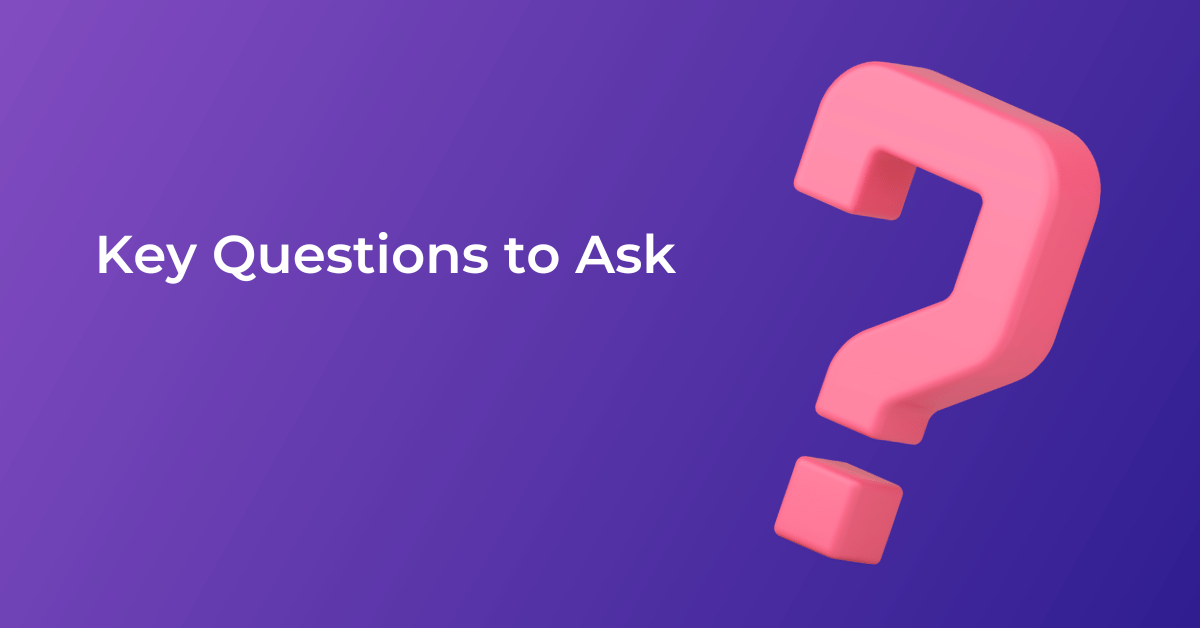Asking the right questions at the end of your interview can significantly improve your chances of securing the job. Stand out from the crowd and really show that you care about getting the job.
But what are the best questions to ask at the end of your interview? That’s what we are here for!
We have over 20 different questions and explanations here as to why you should ask them.
So take your pick and really show your interviewer that you are the best candidate for the job!

Why Asking Questions Matters
Demonstrates Genuine Interest
When you ask thoughtful questions, it shows you’re not just seeking any job but are genuinely interested in this particular role and company.
For example, inquiring about specific projects the team is working on or recent company initiatives indicates that you’ve done your research and are eager to learn more. This level of enthusiasm can leave a lasting impression on the interviewer.
It’s important to tailor your questions to the specific job and company, showing that you’ve put in the effort to understand the unique aspects of the organization.
For instance, if you’re interviewing for a marketing position, you might ask,
“Can you tell me more about the recent marketing campaigns and their outcomes?”
This question shows that you’re interested in the company’s marketing strategies and success, which is directly relevant to the role you’re applying for.
Similarly, if you’re applying for a software development role, asking about the technology stack and current projects can demonstrate your technical interest and readiness to contribute.
Showcases Your Understanding
Asking informed questions demonstrates that you’ve done your homework and understand the company and industry.
If for example, you ask about how a recent company announcement might affect the department you’re applying to, it shows you’re keeping up with company news and thinking critically about your potential role.
This type of question not only highlights your preparedness but also shows that you’re thinking ahead about how you can contribute to the company’s goals.
Moreover, you can ask about industry-specific trends or challenges.
For example, if the company is in the healthcare industry, you might ask,
“How is the company adapting to the changes brought about by new healthcare regulations?”
This demonstrates your awareness of external factors affecting the industry and your potential role in addressing them.
Highlights Critical Thinking
By asking probing questions about the role, company challenges, or industry trends, you exhibit your analytical skills and strategic thinking. This shows that you’re considering how you can contribute to the company’s success. Asking about the biggest challenges the company faces and how your role can help address them shows your proactive approach to problem-solving.
You might ask,
“What are the key challenges currently facing the team, and how can this role help address them?”
This question shows that you’re not just thinking about your day-to-day tasks but are also considering the broader impact you can have on the team and company.
Provides Valuable Information
The interview is a two-way street. By asking questions, you gain insights that help you decide if the job and company are right for you.
Inquiring about team dynamics or company culture can give you a better sense of whether you’d thrive in the environment. Understanding the company’s values, work-life balance, and employee support systems can help you make an informed decision about whether this is the right place for you.
Consider asking:
“Can you tell me more about the company’s approach to professional development and career growth?”
This gives you an insight into how the company supports its employees’ long-term success and whether there are opportunities for you to grow within the organization.
Leaves a Lasting Impression
Thoughtful, engaging questions can leave a positive final impression, crucial when the hiring team makes their decision.
Questions that show genuine curiosity and insight are more likely to be remembered favorably.
Your goal is to end the interview on a strong note, leaving the interviewer with the impression that you are not only qualified but also deeply interested and engaged.
For instance, asking:
“What do you enjoy most about working here?”
allows the interviewer to share their personal experiences, creating a more conversational and memorable end to the interview.

Company Culture and Values
What are the company’s core values, and how do they manifest in day-to-day operations?
This question shows your interest in aligning with the company’s principles and understanding how they are put into practice. It demonstrates that you value a workplace whose values resonate with your own.
By understanding how these values translate into daily operations, you can better envision yourself in the role and determine if it’s a good cultural fit.
Can you describe the company culture and what you enjoy most about working here?
This gives you insight into the work environment and employee satisfaction from someone with firsthand experience.
It can reveal aspects of the company culture that aren’t apparent from the outside, such as team dynamics, work-life balance, or unique traditions.
The interviewer’s personal perspective can provide valuable insights into what it’s really like to work there, helping you make a more informed decision about the opportunity.
How does the company support work-life balance?
Understanding the company’s approach to work-life balance can help you work out if it aligns with your personal needs and values.
This question can reveal policies on flexible working hours, remote work options, or other benefits that contribute to employee well-being.
It also shows the interviewer that you’re thinking holistically about your potential role in the company and how it fits into your life.
What initiatives does the company have in place for employee well-being and satisfaction?
This demonstrates your interest in the company’s commitment to its employees and can reveal additional benefits or programs.
It shows that you value a workplace that invests in its people, which can be a sign of a healthy company culture.
The answer can provide insights into wellness programs, professional development opportunities, or other initiatives that contribute to employee satisfaction and retention.
How does the company approach diversity, equity, and inclusion?
Asking about DEI initiatives shows that you value an inclusive workplace and are interested in the company’s efforts in this area.
It demonstrates your awareness of important social issues and your desire to work in an environment that respects and celebrates diversity.
The response can give you insight into the company’s values and commitment to creating an equitable workplace for all employees.

Role-Specific Inquiries
What does a typical day look like in this position?
This question helps you visualize yourself in the role and understand the day-to-day responsibilities.
It gives you a concrete idea of what to expect if you’re hired, allowing you to assess if the daily tasks align with your skills and interests.
The answer can reveal the balance between different types of work (e.g., independent tasks vs. collaborative projects), the pace of the work environment, and the variety of responsibilities you’ll handle.
This information is crucial for determining if the role matches your working style and career goals.
What are the biggest challenges someone in this role might face?
Understanding potential obstacles shows that you’re prepared to tackle difficulties and want to succeed in the position.
It demonstrates your proactive approach to problem-solving and your desire to be fully prepared for the role. The answer can provide insights into the complexities of the job, helping you gauge whether your skills and experience are well-suited to overcome these challenges.
It also gives you an opportunity to discuss how you’ve handled similar challenges in the past, further showcasing your qualifications.
How does this role contribute to the company’s overall goals?
This question demonstrates that you’re thinking beyond your individual tasks and are interested in how your work impacts the broader organization.
It shows that you have a strategic mindset and are eager to align your efforts with the company’s mission. Understanding the role’s significance can help you prioritize tasks effectively and make decisions that support the company’s objectives.
It also indicates to the interviewer that you’re interested in being a valuable, integrated member of the team, not just completing assigned tasks.
What key skills or qualities do you believe are essential for success in this position?
Asking this allows you to assess how well your skills align with the role and identify areas where you might need to develop further.
It gives you insight into the company’s expectations and what they value most in an employee.
This information can help you emphasize relevant strengths during the interview and, if hired, focus on developing critical skills for the role.
It also shows the interviewer that you’re committed to meeting and exceeding expectations in the position.
Can you tell me about the team’s current projects and priorities?
This shows your interest in hitting the ground running and helps you understand what you’ll be working on if hired. It demonstrates that you’re forward-thinking and eager to contribute to ongoing initiatives.
Understanding current projects can help you envision how your skills and experience might be applied immediately.
It also provides an opportunity to discuss how your background aligns with these priorities, further reinforcing your suitability for the role.

Team Dynamics
Can you tell me about the team I’d be working with?
This question helps you understand the team structure and the people you’ll be collaborating with daily.
It shows your interest in the interpersonal aspects of the job and your recognition that successful teamwork is crucial.
The answer can provide insights into team size, roles, expertise levels, and potentially the team’s culture.
This information can help you assess how well you might fit in and how your skills could complement the existing team.
It also demonstrates to the interviewer that you value collaboration and are thinking about how you’ll integrate into the team.
How does the team collaborate and communicate?
Understanding communication practices gives you insight into the team’s workflow and helps you prepare for the working style.
It shows that you recognize the importance of effective communication in successful teamwork.
The answer can reveal whether the team relies on specific tools or methodologies (e.g., Agile, Scrum), the frequency of team meetings, and the balance between independent and collaborative work.
This information can help you gauge whether the team’s communication style aligns with your preferences and strengths. It also indicates to the interviewer that you’re proactive about ensuring smooth collaboration.
What are the team’s current priorities and recent achievements?
This shows your interest in the team’s success and helps you understand their focus and accomplishments.
It demonstrates that you want to contribute to ongoing efforts and be part of future achievements. Understanding current priorities can help you envision how your skills might be applied immediately if hired.
Learning about recent achievements gives you insight into what the team values and how they measure success.
This question also allows you to show enthusiasm for the team’s work and potentially discuss how your experience aligns with their goals.
How does this role interact with other departments or teams within the company?
This demonstrates your understanding of cross-functional collaboration and your interest in the broader organizational structure.
It shows that you recognize the importance of working effectively across different areas of the company.
The answer can provide insights into the scope of the role and the variety of stakeholders you’ll be working with.
This information helps you assess whether the level of cross-departmental interaction aligns with your preferences and skills.
It also indicates to the interviewer that you’re thinking holistically about your potential impact on the organization.
Can you describe the management style of the team leader or direct supervisor?
Understanding leadership styles helps you determine if you’ll thrive under the team’s management approach.
It shows that you recognize the impact of management on job satisfaction and performance.
The answer can reveal aspects of the work environment such as autonomy levels, feedback frequency, and decision-making processes. This information can help you assess whether the management style aligns with your preferences and how you work best.
It also demonstrates to the interviewer that you’re thoughtful about workplace dynamics and your own professional needs.

Career Development Opportunities
What opportunities for growth and advancement exist within the company?
This shows your long-term interest in the company and your ambition for career progression.
It demonstrates that you’re not just looking for a job, but a career path.
The answer can provide insights into the company’s approach to internal promotions, typical career trajectories, and the potential for taking on increased responsibilities over time.
This information can help you assess whether the company aligns with your long-term career goals.
It also signals to the interviewer that you’re committed to growing with the company and contributing over the long term.
Does the company offer any training programs or professional development resources?
Asking about learning opportunities demonstrates your commitment to continuous improvement and skill development.
It shows that you’re proactive about enhancing your capabilities and staying current in your field.
The answer can reveal formal training programs, mentorship opportunities, conference attendance policies, or educational reimbursement benefits. This information can help you understand how the company invests in its employees’ growth.
It also indicates to the interviewer that you’re eager to learn and adapt, which are valuable traits in any employee.
Can you share examples of employees who have progressed from this role?
This gives you concrete examples of career paths within the organization and shows your interest in long-term growth.
It demonstrates that you’re thinking about your future with the company and are interested in advancement opportunities.
The answer can provide real-world insights into potential career trajectories and the company’s track record of promoting from within.
This information can help you envision your own potential path within the organization. It also shows the interviewer that you’re ambitious and interested in growing with the company.
How does the company support employees in achieving their career goals?
This question reveals the company’s commitment to employee development and can give you insight into mentorship or coaching programs.
It shows that you value an employer who invests in their staff’s professional growth.
The answer can provide information about career planning resources, performance review processes, or individual development plan practices. This information can help you understand how proactive you’ll need to be about your own career development within the company.
It also demonstrates to the interviewer that you’re thinking seriously about your professional future and how it aligns with the company’s support structures.
Are there opportunities for cross-departmental training or job rotation?
Asking about diverse experiences shows your interest in gaining a well-rounded understanding of the business.
It demonstrates your curiosity and desire to learn about different aspects of the company.
The answer can reveal whether the company encourages employees to broaden their skills and experience across different areas of the business. This information can help you assess the potential for varied work experiences and skill development beyond your immediate role.
It also indicates to the interviewer that you’re interested in contributing to the company in multiple ways and potentially preparing for broader responsibilities in the future.

Next Steps and Follow-Up
What are the next steps in the hiring process?
This question shows your enthusiasm for moving forward and helps you understand the timeline for decision-making.
It demonstrates that you’re proactive and interested in progressing to the next stage.
The answer can provide valuable information about additional interviews, assessments, or other requirements you might need to prepare for.
Understanding the process can help you manage your expectations and plan accordingly. It also gives you an opportunity to showcase your preparedness and enthusiasm for the role.
For the interviewer, it signals that you’re seriously considering the position and are eager to move forward.
When can I expect to hear back about the position?
Knowing the timeline helps you plan your follow-up and manage your expectations.
It shows that you’re interested in the outcome and respectful of the company’s process.
The answer can give you a clear idea of when to expect a response, reducing anxiety and preventing premature or excessive follow-ups.
This information is crucial for your own job search planning, especially if you’re considering other opportunities.
It also demonstrates to the interviewer that you’re organized and mindful of professional courtesies.
If the stated timeline passes without contact, this information gives you a legitimate reason to follow up.
Is there any additional information you need from me?
This demonstrates your proactivity and ensures the interviewer has everything they need to make a decision.
It shows that you’re thorough and willing to go the extra mile to facilitate the hiring process.
The answer might reveal that they need additional documents, references, or work samples, allowing you to provide these promptly.
By asking this, you’re also giving yourself one last opportunity to address any potential concerns or highlight relevant qualifications.
For the interviewer, it shows that you’re committed to providing a complete picture of your candidacy and are eager to assist in their decision-making process.
Who is the best person to contact if I have any further questions?
This helps you maintain communication and shows your interest in staying connected throughout the process.
It demonstrates your professionalism and your understanding of proper business etiquette.
The answer provides you with a specific point of contact, which can be invaluable if you need to follow up or provide additional information.
Having this information also allows you to personalize your thank-you note after the interview.
For the interviewer, it shows that you’re organized and respectful of the company’s communication channels.
In Closing
Asking the right questions at the end of your interview can make a huge difference in how you are perceived by the interviewer.
These questions not only provide you with valuable information but also demonstrate your genuine interest, professionalism, and thoughtful approach to the job search process.
By preparing and asking insightful questions, you can take an active role in the interview, leave a lasting impression, and gather crucial information to help you make an informed decision about the opportunity.
Remember, the interview is not just for the employer to evaluate you, but also for you to evaluate the employer and ensure it’s the right fit for your career goals and values.



